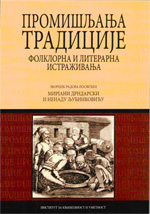У Будима у бијела града. Прилог истраживању старине епског десетерца
U Budima u bijela grada. A Contribution to the Research on the Prehistory of the Epic Decasyllable
Author(s): Aleksandar Loma
Subject(s): Serbian Literature, Theory of Literature
Published by: Институт за књижевност и уметност
Summary/Abstract: The paper deals with the so-called ”epic genitive” which in South Slavic epic decasyllable and long-verse poems often substitutes the accusative of inanimate objects, e.g. mača plamenoga ‘(he unsheathed) the fiery sword’ and of direction, e.g. u bijela grada ‘(he went) into the white town’. Such forms are ungrammatical and metrically conditioned, i.e. they fit into the second half-line of the decasyllable, which is not the case with the gramatically correct sentences, e.g. u b(ij)eli grad ‘to the white town’, at least after the loss of the final ”weak” semi-vowels shortly before 1000 A.D., for hitherto, in its original phonetic shape, the sequence *vъ(n) bělъjь gordъ, with six syllables, the penult long and the preceeding two short, perfectly matched the second hemistich of the Common Slavic epic decasyllable as reconstructed by Roman Jakobson; consequently, the pattern must be older than the 10th century and rooted in the prehistoric past. The substitution of genitive for accusative may be regarded as purely morphological process, inspired by the analogy of the category of animate nouns in which genitive is used to design the direct object, and/or by the phonetic coincidence of two Common Slavic prepositions, *vъ ‘in(to)’ with accusative and locative and *u ‘at’ with genitive, in Serbian. However, the starting point of the development may have been a phonetic phenomenon, the persistent pronunciation of final weak semivowels in the metrical speech long after their fall in the spoken language, not unlike the ”e muet” in French poetry, e.g. u Budimə gradə, which subsequently resulted in u Budima grada ‘into the town of Buda’ as the shwa reflecting Common Slavic ъ and ь in the strong position turned, in Shtokavian, into the full vowel a. It was supposedly only then, in the 14th–15th centuries, that the original accusative in those inherited formulas was reinterpreted as a genitive in a. In any case, the ”epic genitive” seems to be an archaism bearing a further testimony to the prehistoric roots of Serbian oral poetry. Additionaly, the occurence in the reconstructed formulas of the word *gordъ ‘town’, initially ‘enclosure, fortified place’, confirms that fortresses played in the epic world outlook of the ancient Slavs a role no less important than among other early Indo-Europeans.
Book: Промишљања традиције
- Page Range: 49-62
- Page Count: 14
- Publication Year: 2014
- Language: Serbian
- Content File-PDF

